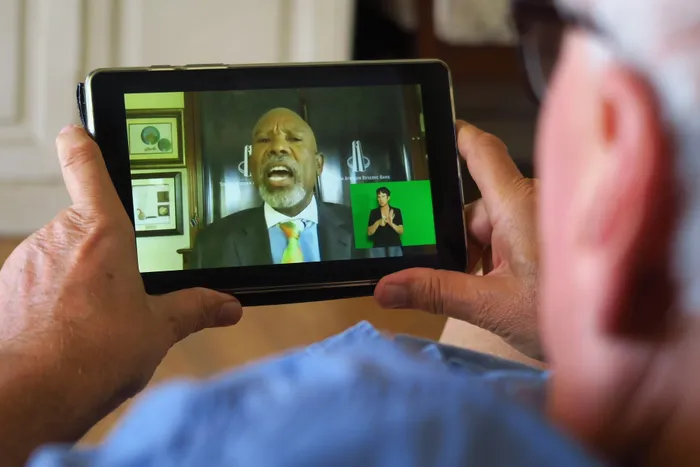Consumers wait with bated breath for SA Reserve Bank’s decision on interest rates

South African Reserve Bank (SARB) Governor, Lesetja Kganyago, Picture: David Ritchie, African News Agency (ANA).
Consumers will be holding their breath as the South African Reserve Bank (SARB) will announce its Monetary Policy Committee’s (MPC) decision on the country’s interest rates on Thursday.
Many economists have been split over what the SARB governor Lesetja Kganyago will announce, with some saying the country is in for another 25 Basis Point (BPS) hike, while others say it will remain unchanged.
Frank Blackmore, Lead Economist at KPMG South Africa, told Business Report, “Regarding the expectations for the MPC’s decision in July 2023, as long as the inflation rate remains above the target rate of 4.5% and expectations for inflation remain unanchored - in other words, any higher than that 4.5%, it gives the Governor of the Reserve Bank leeway in order to increase interest rates in order to combat inflation at that level. My read is that for July, we will have an additional 25 basis points given that inflation expectations remain unanchored from the 4.5% level and the most recent inflationary read is still above the target of 4.5%. In fact, it's outside the upper bound of the 3 - 6% previous range.”
On Wednesday, Stats South Africa announced that consumer prices in South Africa dramatically retreated to their lowest in 20 months in June, dragged lower by fuel and food prices during the month.
Annual headline inflation cooled to 5.4% in June from 6.3% year-on-year in May, sinking below the upper limit of the South African Reserve Bank’s (SARB) monetary policy target range.
The rate in June is the lowest reading since October 2021, when the rate was 5.0%, and the last time inflation was below 6% was in April 2022.
On a monthly basis, however, inflation increased by 0.2% in June.
“I think this would potentially be the last increase in the repo rate, given that we clearly see a downward trend in inflation. This downward trend may slow somewhat given the increases in electricity that we've seen in July, and perhaps other shocks such as petrol, given the exchange rate depreciation that we've seen. But the general long-term trend will be downwards, and by end of the year, we should be close to the target of 4.5% in terms of inflation, and we may even get a reduction in interest rates by year-end,” Blackmore further said.
Brina Biggs, Senior Manager at 1Life, said that there will hopefully be some continued good news for South Africans.
“Other considerations that can negatively affect South Africans’ pockets are the potential for a fuel price increase in August due to the higher oil prices and the rand's flat performance against the US dollar. Hopefully, the increase in load shedding last week does not have a further negative impact in the weeks to come,” Biggs said.
After July’s mixed fuel price adjustments that saw petrol coming down slightly and diesel going up, early data has indicated that it both types of fuel will become more expensive from August.
Thankfully for those with petrol-powered cars, next month’s price hike is likely to be a small one, but owners of diesel vehicles will be hit with a more substantial increase.
Although it is too early to make an accurate prediction, current data is pointing towards an increase in the region of 10 cents per litre petrol, while diesel is looking set to go up by around 45 cents.
Hayley Parry, Money Coach and Facilitator at 1Life’s Truth About Money, said that economists are divided whether or not the South African Reserve Bank is going to pause on the current hiking cycle or perhaps pass another 25bps increase.
“So, this hiking cycle that we have seen in place since November 2021 has seen 10 consecutive rate hikes, and it has taken the repo rate to 8.25%, which is a high last seen in 2009. What this means for consumers is that the cost of servicing our debt has increased at least 4.75%, and so whether or not it's going to go all the way up to 5% on Thursday or not, remains to be seen. What we do know is that consumers are desperate for this hiking cycle to pause, to give everyone a little bit of room to figure out how they can make ends meet, as at the moment it has been tough for consumers, and there is the potential that this hacking cycle is not yet over.”
Andra Nel, Purpose Manager at KFC’s Add Hope, says that most South Africans are waiting with bated breath for the announcement, and the reality is that most economists are looking at an additional hike of 25 basis points, which is just adding to the compounded pressure that consumers are feeling already.
“Not only are the poorest of the poor struggling to make ends meet and to put food on the table, but the reality of it is that when you look at the average cost of their household food basket, more than R5000, this is just insurmountable and unattainable for a majority of South Africans, and as we head into the winter season, the scale of inequality our country is more evident than ever that people are struggling to meet the increased utility bills. As the outlook for the massive food inflation remains uncertain to the rising cost low shedding and drier weather conditions, there is something that needs to be done, but hope is only a R2 away, and we will continue to add hope as KFC, and we invite our consumers and South Africans that spare that R2 to give that donation whenever they visit our local KFC to make a difference to those that need it most,” she said.
BUSINESS REPORT